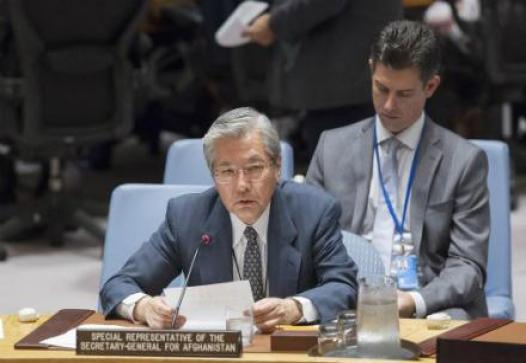AT Monitoring Desk-KABUL: UN Secretary General Special Representative for Afghanistan, Tadamichi Yamamoto has said holding of timely, credible, and accepted elections was indispensable to maintain the constitutional order and trust in the representative system of government.
Addressing the UNSC, he said there has been insufficient progress on electoral preparations. The lack of progress, and intense criticism from electoral stakeholders, led the independent electoral commission to vote to remove its chairman.
“The commission needs to demonstrably advance on electoral preparations to regain its credibility,” he said.
The UN technical support team had been working closely with the IEC on the operational concept of voter registration and would assist the commission in its implementation, though this is ultimately a process that must be owned and led by Afghan institutions.
The envoy underlined security as a defining factor enabling credible and inclusive elections. The Afghan Government needed to have a thorough security plan for this democratic exercise, he said.
The special representative called upon Afghans to come together and find ways to build their own joint future.
“I also called upon each country of the region to help create an environment conducive to peace in Afghanistan and the region. We must use the upcoming winter months, when conflict levels tend to decrease, to advance on this issue before the cycle of violence is renewed next spring,” he said.
The envoy called on the Taliban to express a clear willingness to begin negotiations towards a political settlement, and to start the initial dialogue.
He said The Kabul Process meeting planned for February 1 would offer an opportunity. At the meeting, the Government of Afghanistan was expected to present its strategic concept for reaching a political settlement with the armed opposition, and seek the support of the international community.
He added the Government and the international partners must focus on how levels of violence could be reduced next year. “We must also seek commencement of a structured dialogue for peace.”
He said UNAMA would continue its efforts to advance women’s political participation. “We recently convened 13 dialogues across the country where women described in often poignant terms how their participation as voters and candidates was obstructed by corruption, conflict and conservative cultural norms.”
Tadamichi said despite an intense fighting season, recent efforts by Afghan security forces to protect civilians had resulted in reductions in civilian deaths and injuries caused by those forces during ground engagements.
“We, however, remain concerned by the continued indiscriminate use of improvised explosive devices by anti-government elements, as well as civilian casualties from air strikes by pro-government forces,” he added.
Highlighting the economic situation in the war torn country, he said the year 2014 led to a collapse in economic growth from 10 percent to minus 2 percent. This year, Afghanistan was expected to record positive growth for the second year, but not enough to absorb the 400,000 young Afghans who annually seek to join the labour force.
At the same time, the illicit economy was expanding, as demonstrated by the massive increase in opium production recorded by UNODC in 2017.
He said the narcotics traders were known to be a source of funds for insurgency. “We must pay more focused attention to these issues and reinforce our efforts.”
For the vision of Afghan economic development to succeed, the Afghan National Peace and Development Framework must be supported. The entire UN family is engaged in a continuing dialogue with the president on better aligning the UN’s work to support the framework, providing value for money, and demonstrating impact.
The envoy said he was concerned about recent reports of increased military activities between Afghanistan and Pakistan. UNAMA has recorded some of the suffering caused by such activities on local residents, including civilian casualties, closures of education facilities, and population displacement. “I call on the Governments of Afghanistan and Pakistan to find ways of collaborating more effectively to address this issue, which affects the populations of both countries.”
 Afghanistan Times
Afghanistan Times




